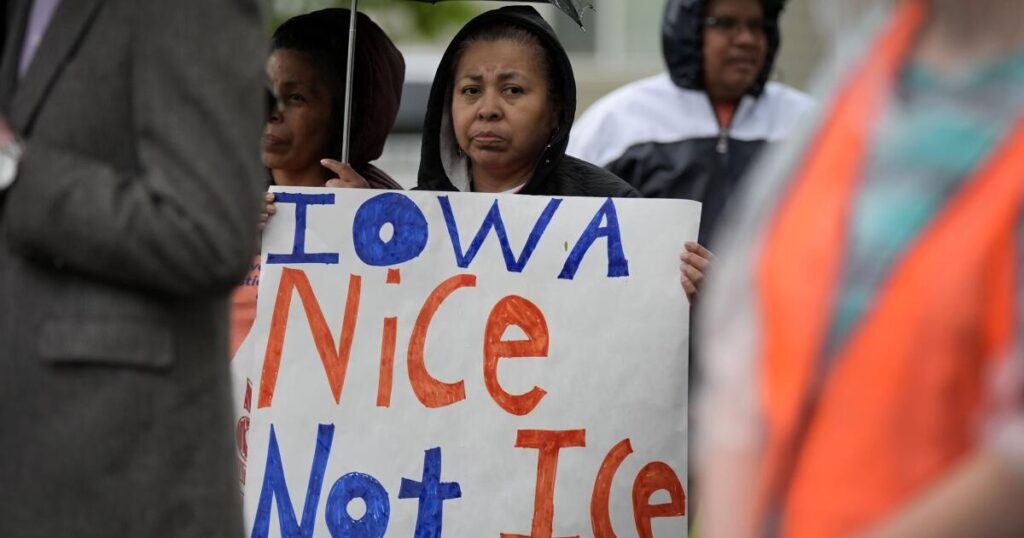The U.S. Department of Justice on Thursday sued the state of Iowa over a new law that gives the state the power to arrest and deport some immigrants, a lawsuit filed the same day seeking to block a bill passed by the state Legislature earlier this year. This was the second case.
The Justice Department's lawsuit and a separate lawsuit filed by civil rights and immigrant rights groups both argued that the state law supersedes federal law and should be declared invalid.
“Iowa cannot ignore the U.S. Constitution and settled Supreme Court precedent,” said Chief Deputy Atty. Gen. Brian M. Boynton, head of the Justice Department's civil affairs division, said in a statement. “We took this action to ensure that Iowa adheres to the immigration regulatory framework adopted by Congress and the Constitution.”
Federal action was expected after the Justice Department warned Iowa officials last week that it would sue unless they agreed not to enforce the new law. The law is similar to a broader Texas law that has been challenged by both the Justice Department and civil rights groups.
The Justice Department's lawsuit comes on the same day that the ACLU of Iowa, the National ACLU, and the American Immigration Council filed suit on behalf of the Iowa Immigration Movement for Justice and two individual Iowans seeking to block the law. I was woken up by
“This ugly law is deeply harmful to Iowa families and communities,” said Rita Bettis Austin, legal director of the American Civil Liberties Union of Iowa. “Iowa lawmakers deliberately targeted people who are protected by federal immigration law and are legally allowed to remain in the country.”
Iowa Atty. Gen. Brenna Byrd said Thursday that the state has no intention of repealing it and that the law exists because President Biden has not secured the southern border.
“Iowa's law is not unique. It simply enforces immigration law while Biden vetoes it,” Byrd said in a written statement. “Iowa stands ready to uphold immigration laws that keep Iowa communities safe.”
Iowa's law raises concerns among the state's immigrant communities that enforcement of the law could lead to racial and ethnic profiling, complicate interactions with police, and discourage community members from reporting crimes. There are growing concerns that people may be discouraged. Activists and advocacy groups, including those named in the lawsuit, hosted rallies to answer people's questions and organized protests in response.
Texas was allowed to enforce the law for a confusing few hours in March before being put on hold by a three-judge panel of the federal appeals court. The committee is scheduled to hear arguments from both supporters and opponents in April and then make a decision on the law's constitutionality.
Some law enforcement officials and legal experts say immigration law enforcement has historically been left to the federal government and is a bilateral process, making it difficult to see how the laws in Iowa and Texas will be enforced. He said there are still unanswered questions about whether this will be done.
An Iowa law that goes into effect July 1 would allow criminal charges against people who have outstanding deportation orders or who were previously deported or denied entry to the United States. After being detained, immigrants can be ordered to leave the U.S., where they can agree with a judge's opinion, or they could be prosecuted and sentenced to prison before being deported.
The federal lawsuit argues that state laws should not be enforced because the Constitution assigns immigration and border control duties to the federal government.
The Iowa lawsuit also says the law conflicts with federal law and could direct police to arrest people who are authorized to stay in the U.S., such as people who have been granted asylum or have visas. It is also claimed that there is a sex. The lawsuit said the law could result in prosecution of children brought to Iowa by their parents.
“It will cause absolute chaos and human suffering in our legal system and harm Iowa communities,” said Meloy Guettel, legal director of the American Immigration Council.
Republican Gov. Kim Reynolds, who signed the new bill into law, reiterated her support for the change.
“As governor, I have a responsibility to protect the people of Iowa,” Reynolds said in a written statement, echoing claims made by other Republican leaders. “Iowa will step in because President Biden refuses to enforce our immigration laws and threatens the safety of our citizens.”
Fingerhut writes for The Associated Press.


